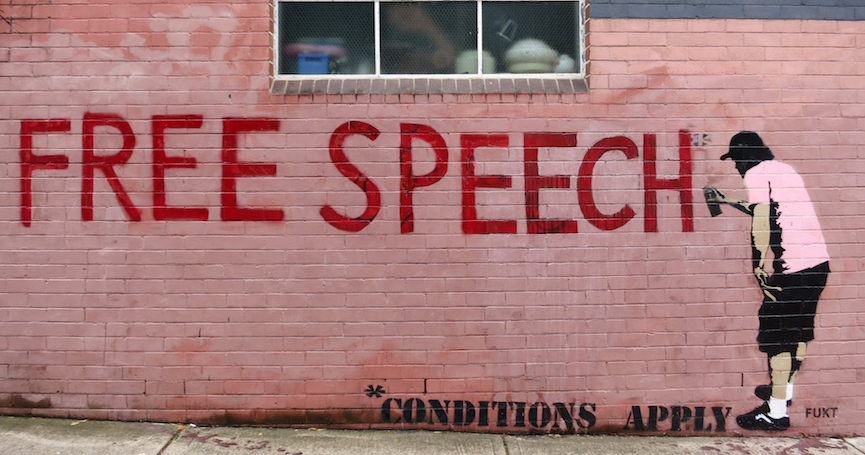Jordan Peterson and Lindsay Shepherd, those intrepid champions of free speech, have launched twin lawsuits against Wilfrid Laurier University. As Peterson intimates fairly strongly in a recent video clip, his own action is really about backing up Lindsay Shepherd, who has launched a lawsuit of her own. It’s hard to see how either can succeed.
With respect to Peterson’s action, I will admit utter bewilderment. A lawsuit for damages is supposed to be about actual damages, not launched for the purpose of helping out a friend. Further, this is not a libel case — a permanent record of the damaging words, circulated by the offending party, is required for that — but one of slander. In libel, damages are assumed. But a successful defamation action in the case of slander requires that actual damages be proven.
It is difficult to fathom how comments made in a private and supposedly confidential meeting have cost Peterson anything (although, perhaps, the other plaintiff might be faulted.) That will be one very steep hill for him to climb; another will be a robust defence of fair comment that Wilfrid Laurier University and the named defendants will be sure to make.
The following criteria for a successful fair comment defence must be met: the matter must be one of public interest, and it is hard to imagine a counter-argument in this case. The impugned commentary must clearly be opinion, rather than a statement of fact. And, while it must be based upon fact, it need not be a reasonable conclusion to draw from those facts — rather, the question is only whether defendants honestly believe that the facts support their commentary.
Readers might wish to have a look at a case in which I was personally involved — where various Speech Warriors™ rallied to the cause of my opponents in the action. “Free Speech,” they cried, and I was painted as a lawfare advocate for objecting to being publicly labelled as a supporter of the Taliban while Canada was at war with them.
In the event, the court found that I had indeed been defamed — but that the defendant honestly believed what he wrote, based upon his bizarre interpretation of my support for justice in the case of Omar Khadr, at the time in the grip of the Guantanamo military tribunal kangaroos. The defence of fair comment prevailed.
The Supreme Court of Canada ruled on this very matter in an earlier case, WIC Radio Ltd. v. Simpson:
Of course it is true that the comment must have “a basis” in the facts, but a requirement that the comment be “supported by the facts”, read strictly, might be thought to set the bar so high as to create the potential for judicial censorship of public opinion. Even the assessment of “relevance” has in the past misled courts into asking whether the facts “warranted” the comment, or whether the comment “fairly” arose out of the facts (Vander Zalm), or other such judgmental evaluations. Insistence on a court’s view of reasonableness and proportionality was thought to represent too great a curb on free expression, but it was not too much to ask a defamer to profess an honest belief in his or her defamatory comment. If the speaker, however misguided, spoke with integrity, the law would give effect to freedom of expression on matters of public interest.
Even if Peterson is successful in his claim that he was defamed — and that’s a stretch, for the reasons given — it is difficult to see how he could overcome the solid precedents that the other side will surely bring forward.
As for Lindsay Shepherd’s lawsuit, blaming her treatment in that supposedly private, closed meeting with her superiors at Wilfrid Laurier for her alleged unemployability in the future seems utterly fanciful. It was her own secret taping of that appalling, cringeworthy inquisition, and her subsequent contact with an eager member of the right-wing press, that led to her current notoriety. If she is unemployable in academia in consequence, she would appear to be the author of her own misfortune. And her subsequent behaviour, which has done her no credit, will no doubt be introduced into evidence by the defendants as well.
The two plaintiffs share the same lawyer. Given Shepherd’s role in widely promulgating what Peterson claims is a harmful slander, how can this be? Why isn’t she a co-defendant in Peterson’s action? How does their lawyer avoid what at least looks like a serious conflict of interest?
Well, I am not a lawyer, as lawyers occasionally remind me, so the courts and the learned legal minds involved will wrestle with these and other conundra while I set the corn a-poppin’. But returning to Peterson just for a moment, some of his comments in the video clip need to be underlined. He contends that the two lawsuits will convince professors and university administrators “blinded by their own ideology” to be “much more circumspect in their actions and their words.” [emphasis added]
Good grief. How quickly Speech Warriors™ turn to the heavy hand of the state when their own oxen are gored. It will be interesting to see how their fellows respond.
Image: wiredforlego/Flickr
Like this podcast? rabble is reader/listener supported journalism.




